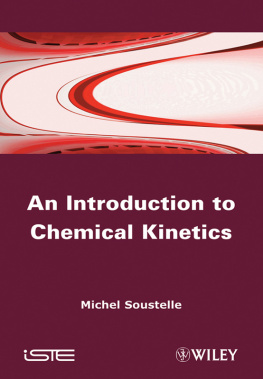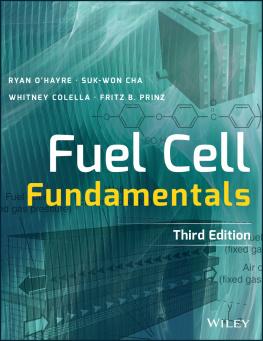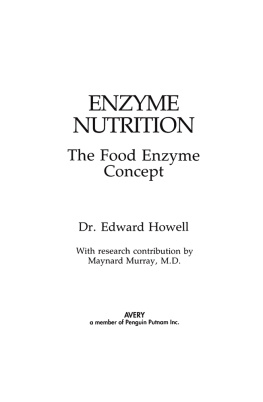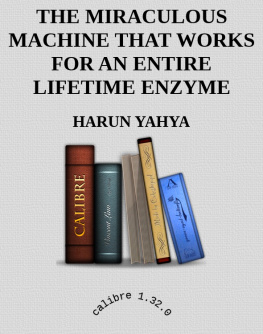F. Xavier Malcata - Mathematics for Enzyme Reaction Kinetics and Reactor Performance (Enzyme Reaction Engineering)
Here you can read online F. Xavier Malcata - Mathematics for Enzyme Reaction Kinetics and Reactor Performance (Enzyme Reaction Engineering) full text of the book (entire story) in english for free. Download pdf and epub, get meaning, cover and reviews about this ebook. year: 2020, genre: Children. Description of the work, (preface) as well as reviews are available. Best literature library LitArk.com created for fans of good reading and offers a wide selection of genres:
Romance novel
Science fiction
Adventure
Detective
Science
History
Home and family
Prose
Art
Politics
Computer
Non-fiction
Religion
Business
Children
Humor
Choose a favorite category and find really read worthwhile books. Enjoy immersion in the world of imagination, feel the emotions of the characters or learn something new for yourself, make an fascinating discovery.

- Book:Mathematics for Enzyme Reaction Kinetics and Reactor Performance (Enzyme Reaction Engineering)
- Author:
- Genre:
- Year:2020
- Rating:5 / 5
- Favourites:Add to favourites
- Your mark:
- 100
- 1
- 2
- 3
- 4
- 5
Mathematics for Enzyme Reaction Kinetics and Reactor Performance (Enzyme Reaction Engineering): summary, description and annotation
We offer to read an annotation, description, summary or preface (depends on what the author of the book "Mathematics for Enzyme Reaction Kinetics and Reactor Performance (Enzyme Reaction Engineering)" wrote himself). If you haven't found the necessary information about the book — write in the comments, we will try to find it.
F. Xavier Malcata: author's other books
Who wrote Mathematics for Enzyme Reaction Kinetics and Reactor Performance (Enzyme Reaction Engineering)? Find out the surname, the name of the author of the book and a list of all author's works by series.
Mathematics for Enzyme Reaction Kinetics and Reactor Performance (Enzyme Reaction Engineering) — read online for free the complete book (whole text) full work
Below is the text of the book, divided by pages. System saving the place of the last page read, allows you to conveniently read the book "Mathematics for Enzyme Reaction Kinetics and Reactor Performance (Enzyme Reaction Engineering)" online for free, without having to search again every time where you left off. Put a bookmark, and you can go to the page where you finished reading at any time.
Font size:
Interval:
Bookmark:
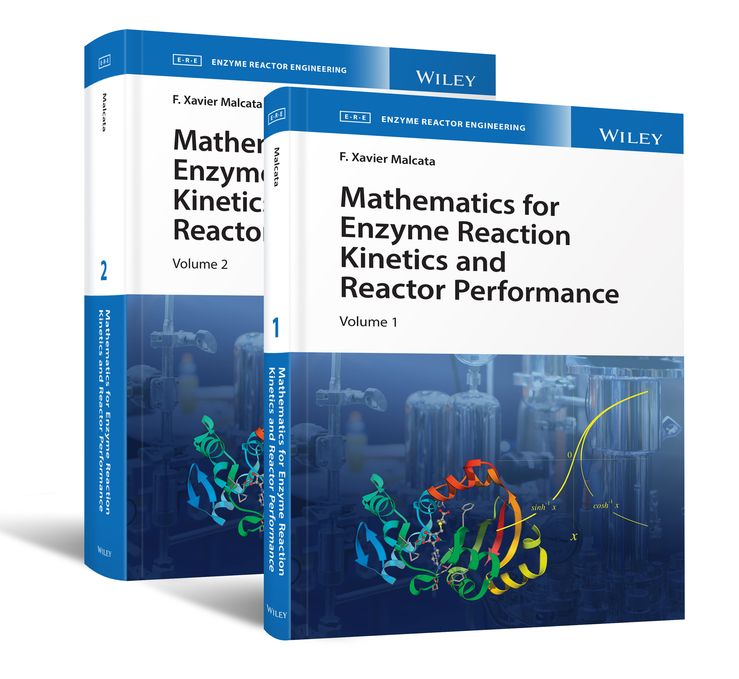
- Chapter 2
- Chapter 7
- Chapter 10
- Chapter 11
- Chapter 12
- Chapter 14
- Chapter 15
- Chapter 17
- Chapter 18
- Chapter 19
- Chapter 2
- Chapter 3
- Chapter 6
- Chapter 7
- Chapter 9
- Chapter 10
- Chapter 11
- Chapter 12
- Chapter 13
- Chapter 14
- Chapter 15
- Chapter 16
- Chapter 17
- Chapter 18
- Chapter 19
ANALYSIS OF ENZYME REACTOR PERFORMANCE
Volume 1
1. Ideal Reactors: Single Unit
Volume 2
2. Ideal Reactors: Multiple Units
Volume 3
3. Nonideal Reactors: Homogeneous with Convection
4. Nonideal Reactors: Homogeneous and Heterogeneous with Diffusion
Volume 4
5. Integration of Chemical Reaction and Physical Separation
Volume 5
6. Integration of Chemical Reactor and External Control
ANALYSIS OF ENZYME REACTION KINETICS
Volume 1
1. Mathematical Approach to Rate Expressions
2. Statistical Approach to Rate Expressions
Volume 2
3. Physical Modulation of Reaction Rate
4. Chemical Modulation of Reaction Rate
ENZYME REACTION KINETICS AND REACTOR PERFORMANCE
Volume 1
1. Basic Concepts of Reactions and Reactors
2. Basic Concepts of Hydrodynamics
Volume 2
3. Basic Concepts of Mass Transfer
4. Basic Concepts of Enthalpy Transfer
5. Basic Concepts of Chemical Reaction
6. Basic Concepts of Enzymes
Volume 1
F. Xavier Malcata
Department of Chemical Engineering, University of Porto
Portugal
You cannot teach a man anything; you can only help him find it for himself.
Galileo Galilei

This edition first published 2019
2019 John Wiley & Sons Ltd
All rights reserved. No part of this publication may be reproduced, stored in a retrieval system, or transmitted, in any form or by any means, electronic, mechanical, photocopying, recording or otherwise, except as permitted by law. Advice on how to obtain permission to reuse material from this title is available at http://www.wiley.com/go/permissions.
The right of F. Xavier Malcata to be identified as the author of this work has been asserted in accordance with the law.
Registered Offices
John Wiley & Sons, Inc., 111 River Street, Hoboken, NJ 07030, USA
John Wiley & Sons Ltd, The Atrium, Southern Gate, Chichester, West Sussex, PO19 8SQ, UK
Editorial Office
The Atrium, Southern Gate, Chichester, West Sussex, PO19 8SQ, UK
For details of our global editorial offices, customer services, and more information about Wiley products visit us at www.wiley.com.
Wiley also publishes its books in a variety of electronic formats and by printondemand. Some content that appears in standard print versions of this book may not be available in other formats.
Limit of Liability/Disclaimer of Warranty
In view of ongoing research, equipment modifications, changes in governmental regulations, and the constant flow of information relating to the use of experimental reagents, equipment, and devices, the reader is urged to review and evaluate the information provided in the package insert or instructions for each chemical, piece of equipment, reagent, or device for, among other things, any changes in the instructions or indication of usage and for added warnings and precautions. While the publisher and authors have used their best efforts in preparing this work, they make no representations or warranties with respect to the accuracy or completeness of the contents of this work and specifically disclaim all warranties, including without limitation any implied warranties of merchantability or fitness for a particular purpose. No warranty may be created or extended by sales representatives, written sales materials or promotional statements for this work. The fact that an organization, website, or product is referred to in this work as a citation and/or potential source of further information does not mean that the publisher and authors endorse the information or services the organization, website, or product may provide or recommendations it may make. This work is sold with the understanding that the publisher is not engaged in rendering professional services. The advice and strategies contained herein may not be suitable for your situation. You should consult with a specialist where appropriate. Further, readers should be aware that websites listed in this work may have changed or disappeared between when this work was written and when it is read. Neither the publisher nor authors shall be liable for any loss of profit or any other commercial damages, including but not limited to special, incidental, consequential, or other damages.
Library of Congress CataloginginPublication Data
Names: Malcata, F. Xavier, author.
Title: Mathematics for enzyme reaction kinetics and reactor performance / F. Xavier Malcata, Department of Chemical Engineering, University of Porto, Portugal.
Description: Hoboken : Wiley, [2019] | Series: Enzyme reaction engineering | Includes bibliographical references and index. |
Identifiers: LCCN 2018022263 (print) | LCCN 2018028979 (ebook) | ISBN 9781119490326 (Adobe PDF) | ISBN 9781119490333 (ePub) | ISBN 9781119490289 (volume 1 : hardcover)
Subjects: LCSH: Enzyme kineticsMathematics.
Classification: LCC QP601.3 (ebook) | LCC QP601.3 .M35 2019 (print) | DDC 572/.744dc23
LC record available at https://lccn.loc.gov/2018022263
Cover Design: Wiley
Cover Image: Background Zarya Maxim Alexandrovich/Shutterstock, Foreground (left) Laguna Design/Getty Images, (right) Courtesy of F. Xavier Malcata
To my family: Antnio, M Engrcia, ngela, Filipa, and Diogo.
For their everlasting understanding, unselfish support, and endless love.
Par est scientia laboris.
(Work is ever the mate of science.)
Prof. F. Xavier Malcata was born in Malange (Angola) in 1963, and earned: a B.Sc. degree in Chemical Engineering (5year program), from the University of Porto (UP, Portugal) in 1986 (with first class honors); a Ph.D. degree in Chemical Engineering (with a distributed minor in Food Science, Statistics and Biochemistry), from the University of Wisconsin (UW, USA) in 1991; an equivalent Doctoral degree in Biotechnology food science and technology, from the Portuguese Catholic University (UCP, Portugal) in 1998; and a Habilitation degree in Food Science and Engineering, also from UCP, in 2004.

Prof. Malcata has held academic appointments as: Teaching Assistant at UCP in 19851987 and at UW in 1988; Lecturer at UW in 1989; Assistant Professor at UCP in 19911998; Associate Professor at UCP in 19982004; and Full Professor at UCP in 20042010, Superior Institute of Maia (ISMAI, Portugal) in 20102012, and UP since 2012. He also held professional appointments as: Dean of the College of Biotechnology of UCP in 19982008; President of the Portuguese Society of Biotechnology in 20032008; Coordinator of the Northern Chapter of Chemical Engineering of the Portuguese Engineering Accreditation Board in 20042009; Official Delegate, in 20022013, of the Portuguese Government to the VI and VII Framework Programs of R&D held by the European Union in such key areas as food quality and safety, and food, agriculture (including fisheries), and biotechnology, respectively; Chief Executive Officer of the University/Industry Extension (nonprofit) Associations AESBUC in 19982008 and INTERVIR+ in 20062008; and Chief Executive Officer of the Entrepreneurial Biotechnological Support Associations CiDEB in 20052008 and INOVAR&CRESCER in 20062008.
Next pageFont size:
Interval:
Bookmark:
Similar books «Mathematics for Enzyme Reaction Kinetics and Reactor Performance (Enzyme Reaction Engineering)»
Look at similar books to Mathematics for Enzyme Reaction Kinetics and Reactor Performance (Enzyme Reaction Engineering). We have selected literature similar in name and meaning in the hope of providing readers with more options to find new, interesting, not yet read works.
Discussion, reviews of the book Mathematics for Enzyme Reaction Kinetics and Reactor Performance (Enzyme Reaction Engineering) and just readers' own opinions. Leave your comments, write what you think about the work, its meaning or the main characters. Specify what exactly you liked and what you didn't like, and why you think so.


